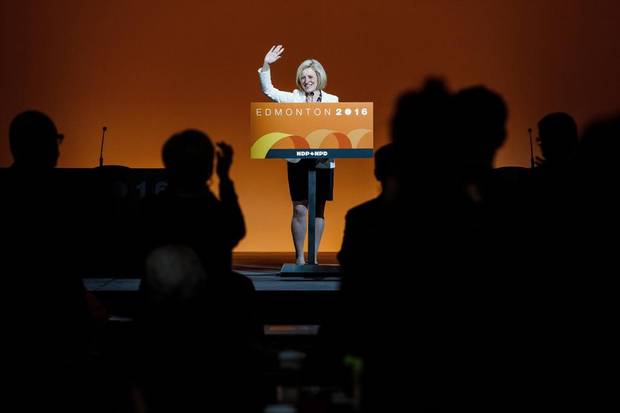Alberta Premier Rachel Notley dramatically rejected the latest focal point of the NDP's left, the Leap Manifesto. She went to the party's national convention last weekend to do it, and delegates still passed a motion to debate the Leap. But don't think that she's now alone in her party: B.C. NDP Leader John Horgan was quick to reject the Leap, too.
What do these two NDP leaders have in common? Western geography, but most notably that they're in the competition for power. Ms. Notley's Alberta NDP government is trying to consolidate its support. And British Columbia, heading to a provincial election next year, is the NDP's next big test.
No, Ms. Notley's not isolated in the NDP. She may have walked along fault lines in the party. But she's on the bigger side.
Her specific beef with the Leapers was about building oil pipelines to tidewater – she's campaigning for one now, while the Leap calls for rejecting all new fossil-fuel infrastructure. But the fault lines are broader: the tug of war between environment-first and employment-first, and a culture clash within the party.
Those fault lines are well known one province to the west. In B.C., the split between the environmental activists and jobs-first labour, the so-called greens and the browns, have long run through the party.
Two decades ago, B.C. NDP premier Mike Harcourt struggled to find a settlement to the War in the Woods protests against logging, while federal New Democrat MP Svend Robinson was arrested. In the 2013 election, former B.C. NDP Leader Adrian Dix's surprise flip-flop to oppose the twinning of the Kinder Morgan oil pipeline from Alberta to Burnaby triggered his slide from front-runner to defeat.
Now Mr. Horgan is doing his own political gymnastics to deal with the cross-pressures of green activists and pro-development labour: his party indicated it will oppose the multibillion-dollar Pacific NorthWest LNG project, got clobbered by unions, and this week, Mr. Horgan signaled the NDP might change its mind.
To put it in cartoonish terms, the divide in the B.C. NDP pits hammer-swingers in labour unions who want jobs against green activists who would often stop big projects – the folks, as Tom Sigurdson, executive director of the B.C. and Yukon Territory Building and Construction Trades Council, put it, "in downtown Vancouver, where nobody wants to see an oil tanker as they're sipping latte in their disposable cups."
Mr. Sigurdson's union is linked to the NDP and he was once an Alberta MLA, and he describes the Leap Manifesto, and its most prominent co-authors, filmmaker Avi Lewis and writer Naomi Klein, as la-la-land. "I think, quite honestly, it's not based in reality," he said.
The Leap's call for Canada to move immediately away from fossil fuel and reject all new fossil-fuel infrastructure is, to Mr. Sigurdson, at odds with the interests of workers linked to the NDP. "I mean, why would we want to put our people out of work immediately?" he said.
There is a real divide for the NDP, in B.C. and across the country. But the way it came up at the convention, with the Leap Manifesto, made it easy for western leaders to pick sides.
B.C. NDP Leader John Horgan.
John Lehmann/The Globe and Mail
Yes, the federal NDP has struggled with its position on oil pipelines. It opposed the Northern Gateway, but was open to Energy East, while waffling. But the Leap, designed as a think-big narrative, talked about rejecting all pipelines. Mr. Lewis protested that the Manifesto wasn't a policy platform, and that it called for a big-money transition to support resource-sector workers – but it had that no-pipeline language, and Mr. Lewis himself described it as radical. No wonder New Democrats negotiating the demands of power, or hoping to, rejected it. And Mr. Lewis and Ms. Klein, filmmaker and author, fit the caricature.
"Basically, the B.C., and now Alberta, the Saskatchewan, Manitoba New Democrats are used to governing," Mr. Harcourt said in an interview. "And we're used to the realities of governing. So we're not sucking cappuccinos in some café in Toronto."
He argues, like Mr. Sigurdson, that those he dismissed are the distinct minority in the NDP across the country. The NDP has to join the two with most of the green activists by hammering out a policy for transition to a green economy, he said, but for the rest: "You blow by them," he said.

Alberta Premier Rachel Notley gives a speech during the 2016 NDP Federal Convention in Edmonton earlier this month.
CODIE MCLACHLAN/THE CANADIAN PRESS
They're right about who makes the majority. Inside the NDP, the westerners are powerful, and those unions are big across the country, including auto workers and steelworkers in Hamilton and Quebec. Most New Democrats would find rejecting those constituencies unthinkable.
And the Leap isn't coming from the newly important Quebec wing, either, noted former New Democrat MP and radio broadcaster Francoise Boivin. The Quebec NDP has all kinds, but its MPs and former MPs showed little interest in the Leap, and joined the party under moderates, said Ms. Boivin, a former Liberal MP. "When Jack Layton came to recruit me, he didn't bring a Leap Manifesto," she said.
There are green activists and opposition to pipelines in the Quebec NDP, but she still thinks an environmentally-sound pipeline that promises to create jobs would get support. The Leap, she argues, is backed by the party's old Toronto and Vancouver left wing who mistakenly believe the party was beaten in the 2015 elections because it was too centrist, when "we just ran a shitty campaign."
Yes, there's a wind right now in the NDP behind a Bernie Sanders-inspired left turn. And the NDP will still struggle with its specific positon on pipelines. But the Leap Manifesto? The NDP convention barely agreed to debate it. It was easy for Ms. Notley to strengthen her political position in Alberta by rejecting it. And she walked out of the NDP convention with a standing ovation.
